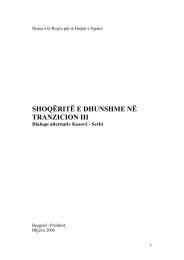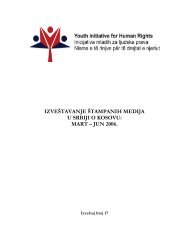Implementation of Transitional Laws in Serbia 2006
Implementation of Transitional Laws in Serbia 2006 - Archive
Implementation of Transitional Laws in Serbia 2006 - Archive
- No tags were found...
You also want an ePaper? Increase the reach of your titles
YUMPU automatically turns print PDFs into web optimized ePapers that Google loves.
<strong>Implementation</strong> <strong>of</strong> <strong>Transitional</strong> <strong>Laws</strong> <strong>in</strong> <strong>Serbia</strong> <strong>2006</strong>before <strong>in</strong>itiat<strong>in</strong>g a procedure with the Ombudsman should bechanged, and <strong>in</strong>stead, a premise should be <strong>in</strong>troduced say<strong>in</strong>g thatemploy<strong>in</strong>g all available legal means is necessary only <strong>in</strong> those caseswhen the Ombudsman holds it efficient.• Submitter <strong>of</strong> a compla<strong>in</strong>t must be protected by law <strong>in</strong> such a waythat a stipulation should be <strong>in</strong>troduced stat<strong>in</strong>g that the submitter’s<strong>in</strong>tervention and compla<strong>in</strong>t will not <strong>in</strong>cur crim<strong>in</strong>al or discipl<strong>in</strong>arysanctions or any other k<strong>in</strong>d <strong>of</strong> discomfort or discrim<strong>in</strong>ation for thesubmitter.• One <strong>of</strong> the most needed amendments to the Law should be itsretroactive implementation <strong>in</strong> those cases when the consequences<strong>in</strong> the form <strong>of</strong> human rights <strong>in</strong>fr<strong>in</strong>gements or abuse <strong>of</strong> powers byGovernmental agencies can still be felt.• Penal stipulations must be <strong>in</strong>cluded <strong>in</strong> the Law, prescrib<strong>in</strong>g f<strong>in</strong>es forbreach<strong>in</strong>g the Law, as for example <strong>in</strong> cases when an <strong>of</strong>ficial failsto timely act upon the Ombudsman’s request or when a persondisregards Ombudsman’s summons.Law on Public InformationThe <strong>Serbia</strong>n National Assembly adopted the Law on Public Informationon April 22, 2003. 429 While it monitored the enforcement <strong>of</strong> this law, theInitiative focused on provisions regulat<strong>in</strong>g the ban on the use <strong>of</strong> hate speech<strong>in</strong> report<strong>in</strong>g, press<strong>in</strong>g charges for hate speech cases and the procedure underwhich such cases were processed.The Law forbids publication <strong>of</strong> ideas, <strong>in</strong>formation and op<strong>in</strong>ions that <strong>in</strong>citediscrim<strong>in</strong>ation, hatred or violence aga<strong>in</strong>st an <strong>in</strong>dividual or a group <strong>of</strong><strong>in</strong>dividuals on grounds <strong>of</strong> their race, religion, nationality, ethnicity, genderor their sexual <strong>in</strong>cl<strong>in</strong>ation 430 . Hate speech is forbidden regardless <strong>of</strong> whethera crim<strong>in</strong>al <strong>of</strong>fence has been committed by such publication 431 . The legalprocedure <strong>of</strong> sanction<strong>in</strong>g hate speech is regulated <strong>in</strong> the follow<strong>in</strong>g manner:the charges for hate speech can be pressed by a person who has been directlydamaged 432 or an organization that protects human rights and protects the429 The Law on Public Information, see above under 1430 Ibid, Article 38431 Ibid432 Ibid, Article 39, Paragraph 193











